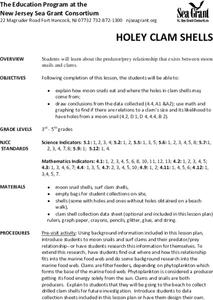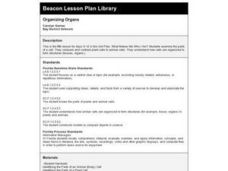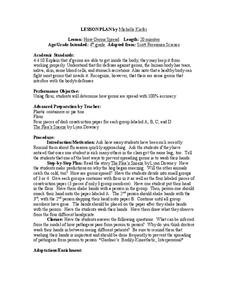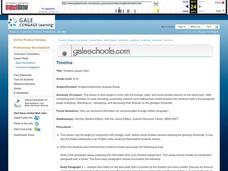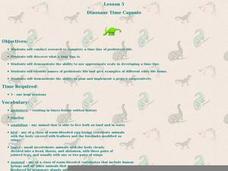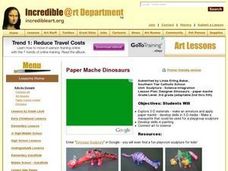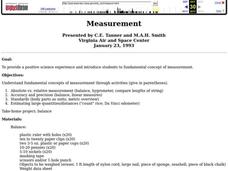Curated OER
Orbital Mechanics
Twelfth graders examine the misconceptions of Newton's laws of motion. In this motion and gravity lesson students interpret data and see the effects of gravity.
Curated OER
Holey Clamshells
Pupils analyze data to make hypotheses and conclusions regarding the predator/prey relationship between moon snail and surf clams.
Curated OER
"I can move" but why?
Students analyze the movements they can do with their bones, muscles and joints. They explore, have discovery and review knowledge of movement. Students are asked to find their personal space.
Curated OER
Organizing Organs
Fifth graders research plant and animals cells and create a Venn Diagram to show the similarities and differences.
Curated OER
Hidden Hibernators
Students review the concept of hibernation and the animals that sleep during all or part of the winter. They complete the Hibernation Word Search Puzzle to name 16 animals that hibernate during the winter months.
Curated OER
How Germs Spread
Fourth graders investigate how germs spread in this lesson. They listen to "The Flea's Sneeze" by Lynn Downey and make predictions on why the hog began sneezing. They then conduct an experiment using flour and paper cups demonstrating...
Curated OER
CSI Clamshell Investigation
Pupils explore and explain how moon snails eat and where the holes in clamshells come from and then draw conclusion from the data collected. They incorporate math and graphing skills to determine if there is a relationship to a clam's...
Curated OER
Using Our Senses
Learners explore their five senses and describe what they sense, describe ways the senses affect their lives, and observe the way that a pediatrician uses his/her senses and tools to examine patients.
Curated OER
Life Traps
Learners participate in a lab activity in which they collect microbes on an agar plate. After discussing microbes and where they might be found, they trap microbes in the Petri dishes following specific guidelines. They observe any...
Curated OER
Bats
Young scholars hypothesize and model how the bones in a bat wing are made up. In this exploratory lesson plan students test their hypothesis, develop questions about bat parts and watch a video on bats.
Curated OER
What Do You Know About Horseshoe Crabs?
High schoolers create a learning tool based on information given on the assigned website. In this ocean life lesson, students read about the horseshoe crab and develop a worksheet, scavenger hunt, board game or any tool to aid learning....
Curated OER
Heat Flow
Pupils explore how a whale's countercurrent flow of blood is an example of a heat exchange system and conduction. Excellent worksheet provided.
Curated OER
Planet Impact
Students use their knowledge to crash a comet into Jupiter or make a comet fly past the planet without colliding with it.
Curated OER
Timeline
Students develop a timeline that depicts geologic development and the history of life. They write an interpretive analysis essay that discusses and reflects on their observations.
Curated OER
Dinosaur Time Capsule
Third graders research prehistoric life using educational software. They design a prehistoric life while showing the use of appropriate scale and names for the prehistoric life. They follow an internet link to participate in a virtual...
Curated OER
Helium Balloon Race
Students determine the force of a helium balloon that allows it to rise a specific distance. In this helium instructional activity students calculate the amount of paper needed to construct a weight and determine the density of a piece...
Curated OER
Asteroids
Students examine the different types of asteroids and how they enter the atmosphere. In this space lesson students use mashed potatoes to create an asteroid they can eat.
Curated OER
Meteors
Students identify the different types of meteorite using an interactive website. In this earth science lesson, students simulate how meteors crash on a surface. They relate meteor size to crater size.
Curated OER
Microbes 1: What's Bugging You?
Students build on existing knowledge of microbes, focusing on the relationship between microorganisms and foodborne illness, as well as the implications that foodborne illness has on human health.
Curated OER
Designer Dinosaurs - Paper Maché
Third graders explore 3-D materials by making a macquette that could be used for a playgroup sculpture. The students design and execute papier-mâché dinosaurs. They develop painting skills and connect art to science.
Curated OER
Measurement
Students experience a positive science experiment and study fundamental concepts of measurement.
Curated OER
Heart Beating Exercise
Students examine video clips and websites that explore the heart. They find and take their pulse while at rest and after exercising. They discuss foods which are good and bad for heart health.
Curated OER
Ocean Life
Learners examine the fossil remains of ancient sea creatures. They create casts of fossils and identify how sea fossils are formed and consider what type of information fossils can give to scientists.
Curated OER
Boys and Puberty
Students describe the internal and external changes boys experience during puberty. Through lecture, students are introduced to changes that faced once the reach puberty. A discussion of personal experience follows the lecture.
Other popular searches
- Human Biology Lesson Plans
- Body Planes
- Body Planes and Cavities
- Anatomical Body Planes
- Body Planes and Directions
- Animal Body Plan
- Human Body Planes
- Lesson Plans Body Hygiene
- Wedges and Human Body
- Body Planes and Regions
- Lesson on Body Planes
- Label Body Planes



